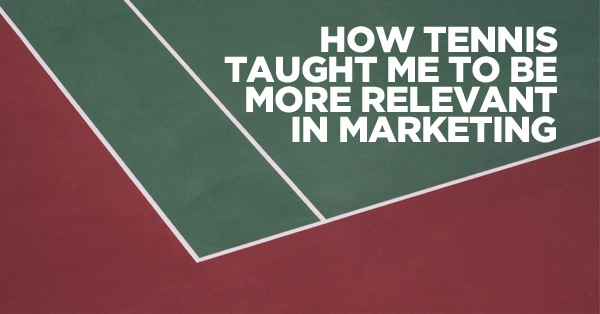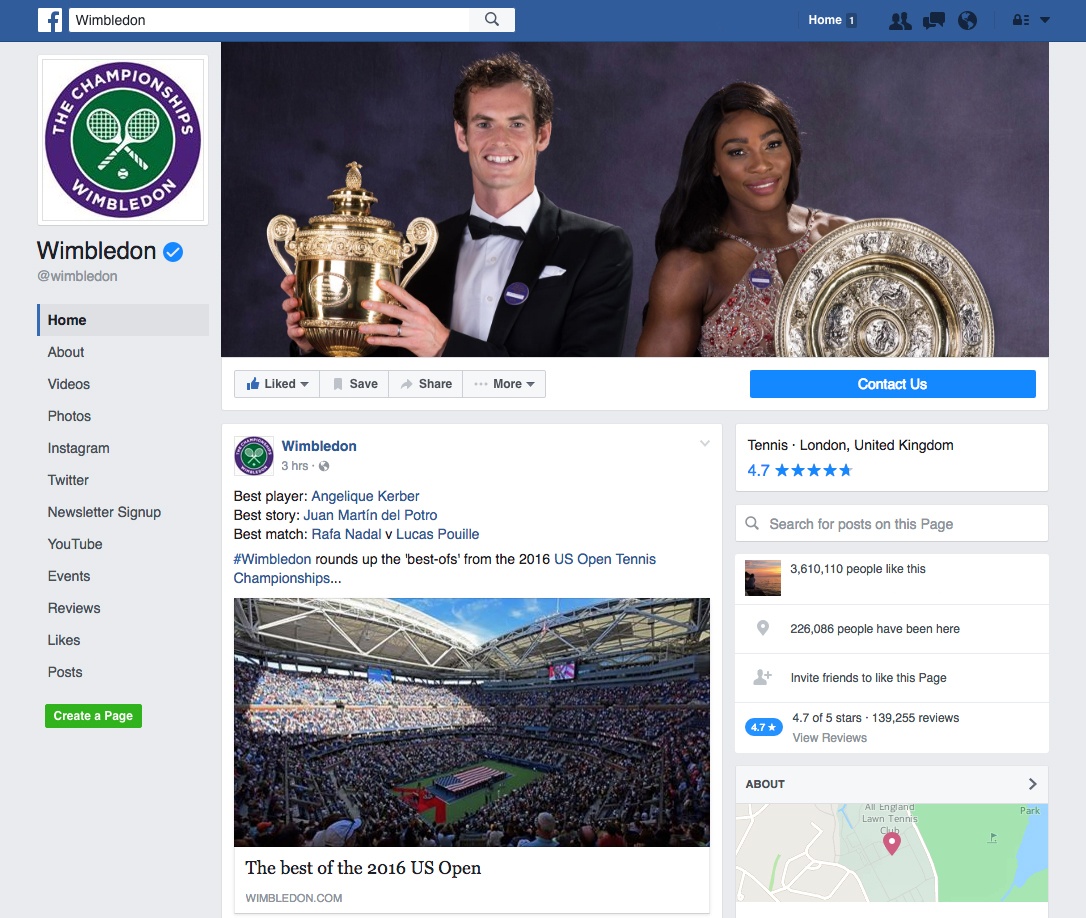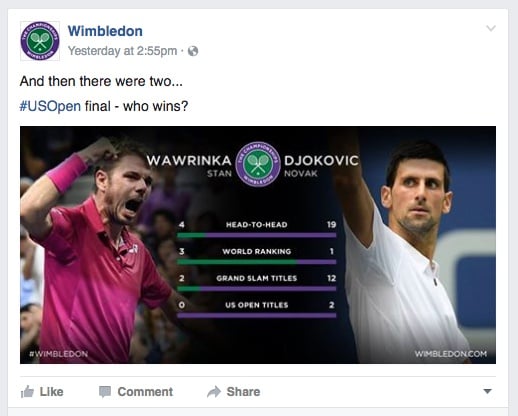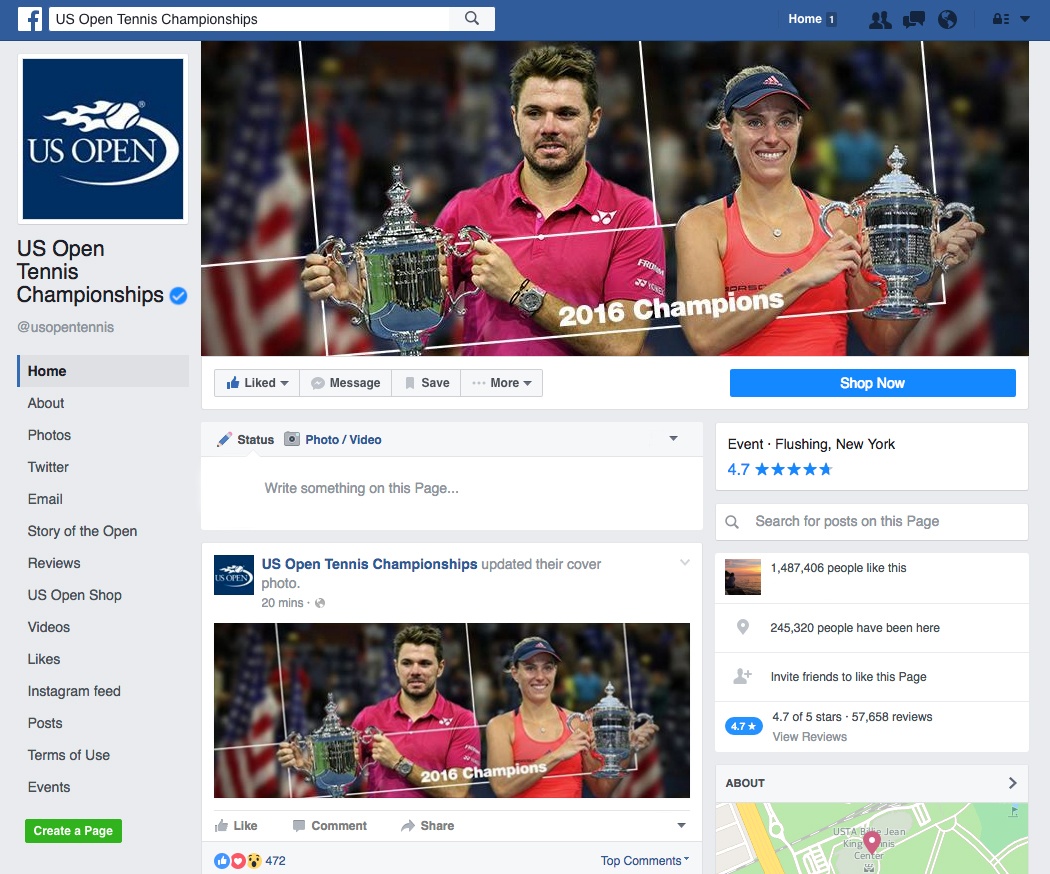
I really enjoy tennis. I play it when I can and follow my favorite players through the various tournaments: the Australian Open, the French Open, Wimbledon, the US Open. I grew up watching Pete Sampras battle it out on the court and watching then-newcomer Roger Federer completely dominate. When I went to Europe for a semester abroad, I waited in hours of traffic to visit the All England Club where Wimbledon is held—three months after the tournament ended.
 Like many Millennials, Facebook is where I get a lot of my news, especially about sports. During July, I’m glued to the Wimbledon Facebook page for updates on players, matches, and the draw in general. Their catchy graphics and links to match summaries keep me coming back for more. This August, during the US Open, I didn’t even realize I hadn’t followed the official US Open page because Wimbledon had the tournament covered.
Like many Millennials, Facebook is where I get a lot of my news, especially about sports. During July, I’m glued to the Wimbledon Facebook page for updates on players, matches, and the draw in general. Their catchy graphics and links to match summaries keep me coming back for more. This August, during the US Open, I didn’t even realize I hadn’t followed the official US Open page because Wimbledon had the tournament covered.
 Throughout the US Open, Wimbledon posted articles about matches published on their own site; they posted graphics of key players and their tournament opponents with stats from this past year at Wimbledon or their careers in general; they tagged popular players and the US Open page in posts. Instead of relying on the US Open page for results and updates, I found myself looking at the Wimbledon website for match summaries.
Throughout the US Open, Wimbledon posted articles about matches published on their own site; they posted graphics of key players and their tournament opponents with stats from this past year at Wimbledon or their careers in general; they tagged popular players and the US Open page in posts. Instead of relying on the US Open page for results and updates, I found myself looking at the Wimbledon website for match summaries.
 Wimbledon completely hijacked my US Open experience—and I’m not complaining. I know that the US Open page has great graphics and articles and up-to-the-minute results and that their website is the same. But I’m a Wimbledon girl: I’m comfortable with their site, their Facebook page, and their brand. Despite the fact that not one match was broadcast on non-cable TV, I stayed more up-to-date on the sport that I enjoy than I would have otherwise.
Wimbledon completely hijacked my US Open experience—and I’m not complaining. I know that the US Open page has great graphics and articles and up-to-the-minute results and that their website is the same. But I’m a Wimbledon girl: I’m comfortable with their site, their Facebook page, and their brand. Despite the fact that not one match was broadcast on non-cable TV, I stayed more up-to-date on the sport that I enjoy than I would have otherwise.
Wimbledon provided me with value by providing content that it knew I would be interested in, even though it’s a completely different tournament. They trusted me when they tagged the US Open; they weren’t afraid I would be lost to them forever. They branded nearly every photo in green and purple, with a logo in the corner. The video on the page was of previous Wimbledon matches, teasing impending US Open showdowns.
Why This Matters to You
Providing valuable and relevant content is key to ensuring your fans, followers, customers, and audience in general are delighted. In marketing, “relevant” is a trending buzzword. It means providing content that is useful and important to your audience. But that content doesn’t have to be focused solely on how your company can solve people’s problems—though that is necessary as visitors go further down the sales funnel. The content you provide can be less directly connected to your product and still be relevant to your ideal audience.
In a recent Fast Company article, real estate agents started providing value to potential home buyers months before they started looking for a house with financial advice on their website and neighborhood newsletters detailing upcoming events. On the surface, those two strategies don’t seem directly connected to home buying, but those real estate agents are becoming trusted thought leaders in their communities, leading to direct revenue down the road and word-of-mouth opportunities. If they think of your company as a reliable source, they will keep coming back.
Be Nimble
The greatest tennis players have the ability to be nimble on the court—I mean, have you seen these shots from Rafael Nadal?—and the greatest marketers should have the same ability. Instead of always having a narrow focus on promoting your specific product or service, open your marketing mind to include discussing other related necessities. What steps need to be taken before your customers are ready to buy and how can you help them prepare for the purchase? Write blog posts about those topics, send out emails with useful information, create infographics with relevant stats, and watch how your audience reacts.
Wimbledon does a great job of providing tennis fans like myself with content I enjoy and in turn I reward them with visits to their site and shares of their content. I can’t wait to see what Wimbledon has to say about the Australian Open in January.
Sparkfactor can help you think through how to target your audience from a different perspective. Contact us today for a free conversation about your marketing campaigns.
